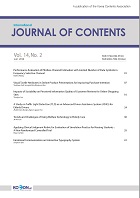- 권한신청
- P-ISSN1738-6764
- E-ISSN2093-7504
- KCI
 ISSN : 1738-6764
ISSN : 1738-6764
Immersive Learning Technologies in English Language Teaching: A Meta-Analysis
이정민 (이화여자대학교)
Abstract
The aim of this study was to perform a meta-analysis of the learning outcomes of immersive learning technologies in English language teaching (ELT). This study examined 12 articles, yielding a total of 20 effect sizes. The Comprehensive Meta-Analysis (CMA) program was employed for data analysis. The findings revealed that the overall effect size was 0.84, implying a large effect size. Additionally, the mean effect sizes of the dependent variables revealed a large effect size for both the cognitive and affective domains. Furthermore, the study analyzed the impact of moderator variables such as sample scale, technology type, tool type, work type, program type, duration (sessions), the degree of immersion, instructional technique, and augmented reality (AR) type. Among the moderators, the degree of immersion was found to be statistically significant. In conclusion, the study results suggested that immersive learning technologies had a positive impact on learning in ELT.
- keywords
- immersive learning technologies, augmented reality, virtual reality, english language teaching, meta-analysis
- 다운로드 수
- 조회수
- 0KCI 피인용수
- 0WOS 피인용수

